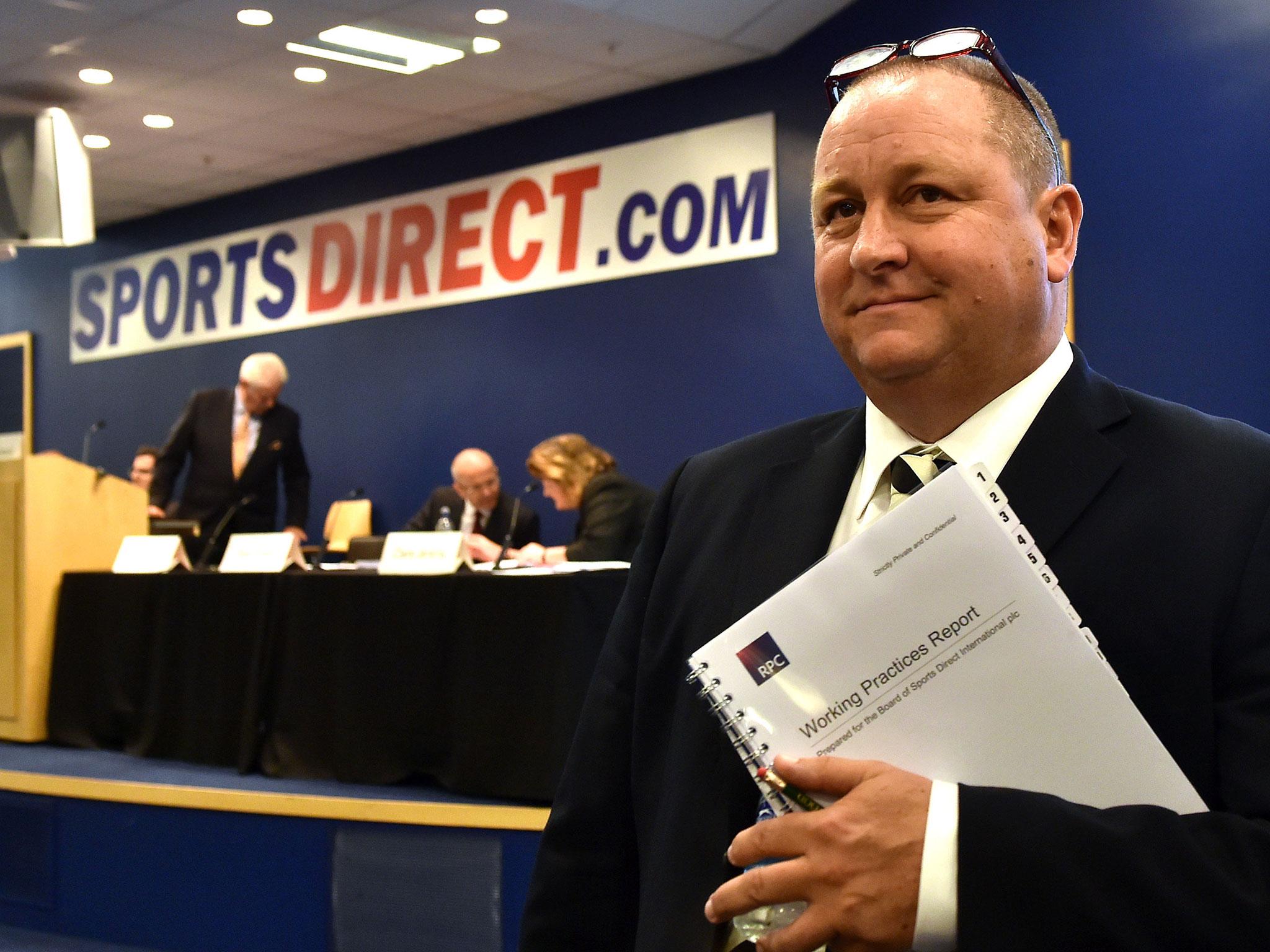Sports Direct agrees to independent review of work practices. Does Mike Ashley get it at last?
The crisis at the company was unnecessary. This is a welcome first step, but further concessions might be needed to draw a line under the affair

Never underestimate Mike Ashley’s capacity to spring a surprise.
A matter of days after a tumultuous, and indeed historic, AGM at which the Sports Direct boss’s independent shareholders voted against the re-election of his chairman Keith Hellawell and backed a trade union motion calling for an independent review into governance and working practices at the business, he appears to have caved in. At least on the latter.
I say appears to have, because you never quite know with Mr Ashley. However, Sports Direct’s stock exchange announcement pledging that a forthcoming “360 degree review of working practices and corporate governance” will now be led by an “independent party other than (Sports Direct lawyer) RPC” is fairly unequivocal.
The company also stated that the selection of a workers’ representative to the Sports Direct board “shall be via democratic staff elections”.
That’s actually less important than it looks. Having a workers representative on the board amounts to little more than PR if their fellow directors aren’t willing to listen to them.
Mr Ashley, who holds the title of executive deputy chairman, has shown precious little inclination to listen to anyone up until now.
Perhaps this is a sign that he is belatedly starting to realise that the mess he has allowed his company to get into while setting himself against independent shareholders, unions, politicians and the media, is entirely self created and utterly unnecessary.
The warnings were all there. Sports Direct had been facing rumblings of discontent for months before the current crisis erupted. What really blew the lid of the scandal, however, was when the dreadful working practices at the company’s Shirebrook warehouse came to light.
They included the use of a public address system to shame staff perceived as working too slowly, fining people 15 minutes pay for being a minute late, operating lengthy queues for security searches before employees were allowed to leave the building, meaning they were in effect being paid less than minimum wage, plus revelations about a string of ambulance call outs, bullying and even sexual harassment.
RPC made note of all those allegations, and more, with its initial report. It didn't confirm them all, but its missive was damning enough, and resulted in another kicking for Mr Ashley’s business.
But the questions over its independence dogged the process and robbed it of credibility. They need never have been raised.
An independent body or firm would have had to throw a few bricks – and they will no doubt do so with the follow up – at Sports Direct to make it look credible. But they wouldn't have, and won't, completely trash the company because they’ll hope for more work in future. That’s the way it goes in the City.
In fact, if you more or less play by the City’s rules, and tip your forelock once in a while, you can basically do what you want as long as you make money.
Just look at the example of Peter Cowgill at Sports Direct rival JD Sports Fashion. He runs the company from the position of executive chairman when best practice says a non-executive chairman should run the board while a chief executive should oversee the company to avoid concentrating power. Mr Cowgill will tell you why that isn’t right for JD Sports Fashion, then point to his numbers. There are one or two people who’ll make an issue of it, but they won’t be listened to.
Has Mr Ashley finally seen the light? Has the latest sparkling set of results at JD concentrated his mind?
Business news: In pictures
Show all 13This latest development came after a meeting with the Investor Forum, a shareholder group largely made up of blue chip institutions. Note of that meeting was made in the statement, which was clearly designed to showing that Mr Ashley is listening. Or making a show of it.
Perhaps he’s realised that by digging his heels in, it has cost him a lot of money. He has also damaged his business and brand; made it the poster child for everything wrong in the City. He’s managed to take some heat off Sir Philip Green, for goodness sake.
He’s going to need to make a few more concessions if he wants to make the fuss go away. Perhaps he will. It's in his interest to because he might then be able to get on with fixing a business that was, when all is said and done, once one of Britain’s best retailers.
Subscribe to Independent Premium to bookmark this article
Want to bookmark your favourite articles and stories to read or reference later? Start your Independent Premium subscription today.

Join our commenting forum
Join thought-provoking conversations, follow other Independent readers and see their replies